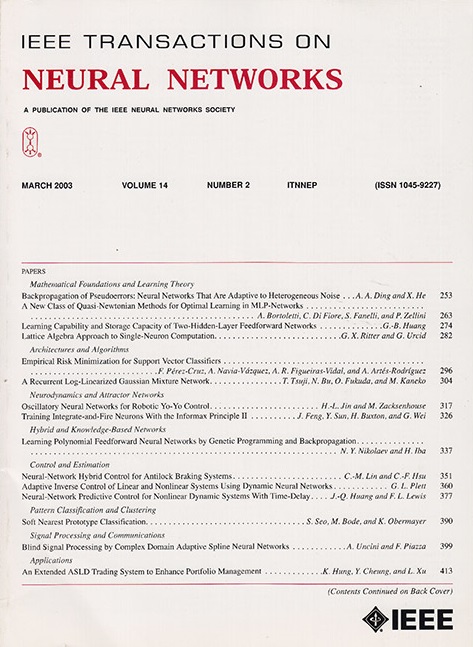增强稳定性和可靠性的神经自适应控制。
IF 8.9
1区 计算机科学
Q1 COMPUTER SCIENCE, ARTIFICIAL INTELLIGENCE
IEEE transactions on neural networks and learning systems
Pub Date : 2025-03-18
DOI:10.1109/TNNLS.2025.3542551
引用次数: 0
摘要
神经网络驱动控制系统的性能取决于控制器中神经网络单元的可靠性和功能性。在运行过程中保持神经网络训练信号(输入)的紧集条件对于保持神经网络的通用学习和近似能力至关重要,但这一要求在现有研究中经常被忽视。本文介绍了一种基于约束变换的设计方法,该方法保证了激励信号总是来自一个固定的区域,而不管初始条件如何。该方法通过满足通用逼近定理所要求的紧性条件,保证了神经网络驱动控制单元的功能性。此外,采用衰减阻尼率使跟踪误差渐近收敛到零,而不是最终均匀有界(UUB)。为了进一步保证即使神经网络由于神经元数量不足或违反紧集条件而表现不佳时也能鲁棒运行,基于神经网络的最坏情况行为开发了一种新的控制策略。这种“故障安全”机制显著提高了基于神经网络的控制方案的可靠性。通过数值仿真验证了所提方法的有效性和优越性,表明其具有显著提高神经网络驱动控制系统鲁棒性和性能的潜力。本文章由计算机程序翻译,如有差异,请以英文原文为准。
Neuroadaptive Control With Enhanced Stability and Reliability
The performance of neural network (NN)-driven control systems hinges on the reliability and functionality of the NN unit in the controller. Maintaining the compact set condition for NN training signals (inputs) during operation is crucial for preserving the NN’s universal learning and approximation capabilities, yet this requirement is often overlooked in existing studies. This article introduces a constraint transformation-based design method that ensures excitation signals always originate from a fixed region, regardless of initial conditions. By meeting the compactness condition required by the universal approximation theorem, this approach safeguards the functionality of the NN-driven control unit. Additionally, a decaying damping rate is employed to enable the tracking error to asymptotically converge to zero, rather than being ultimately uniformly bounded (UUB). To further ensure robust operation even if the NN underperforms due to an insufficient number of neurons or violation of the compact set condition, a new control strategy is developed based on the worst case behavior of NNs. This “fail-secure” mechanism significantly enhances the reliability of the NN-based control scheme. The effectiveness and benefits of the proposed method are confirmed through numerical simulations, demonstrating its potential to substantially improve the robustness and performance of NN-driven control systems.
求助全文
通过发布文献求助,成功后即可免费获取论文全文。
去求助
来源期刊

IEEE transactions on neural networks and learning systems
COMPUTER SCIENCE, ARTIFICIAL INTELLIGENCE-COMPUTER SCIENCE, HARDWARE & ARCHITECTURE
CiteScore
23.80
自引率
9.60%
发文量
2102
审稿时长
3-8 weeks
期刊介绍:
The focus of IEEE Transactions on Neural Networks and Learning Systems is to present scholarly articles discussing the theory, design, and applications of neural networks as well as other learning systems. The journal primarily highlights technical and scientific research in this domain.
 求助内容:
求助内容: 应助结果提醒方式:
应助结果提醒方式:


